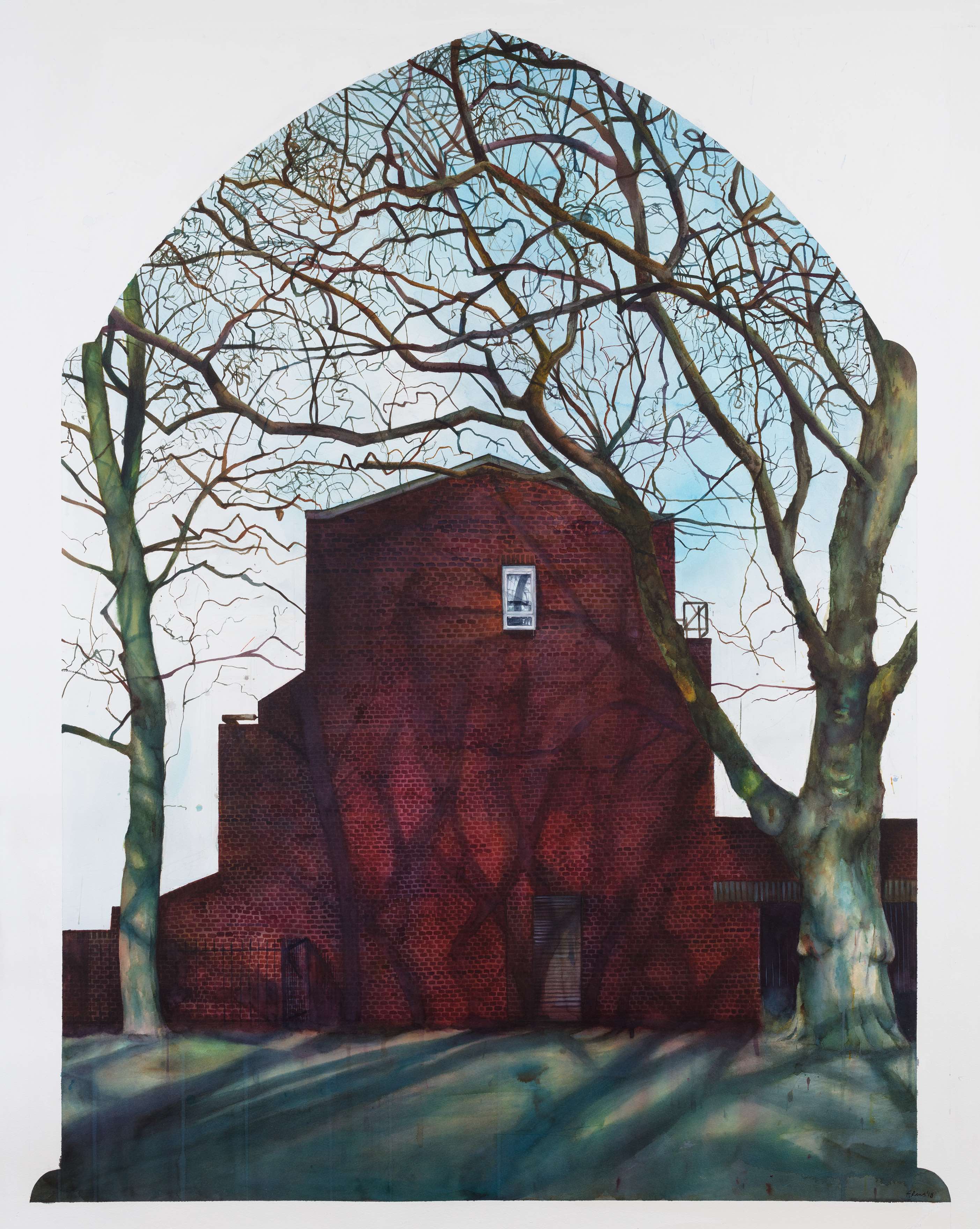A visual homage to the architecture of east London
- Text by Tom Usher
- Photography by Frank Laws

The word ‘Sonder’ – coined in 2012 by the Dictionary Of Obscure Sorrows – is the realisation that “each random passerby is living a life as vivid and complex as your own.”
It’s when meandering around London between midnight and dawn; when the light of the sunrise slowly breaks apart the obsidian into pieces of pink, lilac and indigo, that I often get struck by this feeling, especially when walking past people’s well-lit homes.
That same feeling is pronounced when looking at the work of artist Frank Laws, whose recent exhibition, Monuments, is a collection of paintings documenting the architecture of East London housing.
The paintings are watercolours that depict front doors, lamplit street corners and red-brick estate fronts. Places like Regents and Rhodes Estate, or Beckford House and Banister House, are bathed in evocative lighting that replicates the feeling of walking past them alone at dusk, dawn or night.
“When you look at these, you see homes,” Laws explains. “I don’t put any people in it, but the buildings end up telling you about the people, and become characters in themselves.”

MONUMENT VII

MONUMENT II
“There are loads of people that have told me that the pictures remind them of their own times in around their own homes, coming back from football, or ‘I grew up in a place like that’, or ‘this reminds me of my mum is shouting at me to come in at night.’”
As Brutalism and the architecture of post-war social housing become increasingly glorified in popular culture, it’s easy to forget that these buildings are, first and foremost, where people live. For example, when Robin Hood Gardens – an east London estate that was a perfect example of post-war social housing in the UK – was set to be demolished, there was outrage over a very real sense of loss both socially and architecturally.
It was labelled as an act of “vandalism” by Simon Smithson, the son of one of its original architects, and the V&A Museum even went to great lengths to salvage a three-storey section of it. At the time, they said that it wasn’t “just the object” that they wanted to preserve, but the issues around “social housing and urbanism”. Laws’ Monuments collection, albeit in a less literal way, has a similar aim of preservation.
“I wanted to highlight these very normal houses,” says Laws. “Robin Hood Gardens is a monument to the architecture of social housing, but this is more about giving everyday houses a monumental status.”
“My fantastical idea is that one day in the future these might become future relics. As an idealist, I’d like to think in 100 years time people might look at these paintings and be amazed at what East London used to look like.”

MONUMENT V

MONUMENT I

MONUMENT III

MONUMENT IV

MONUMENT VI
See more of Frank Laws work on his official website.
Follow Tom Usher on Twitter.
Enjoyed this article? Like Huck on Facebook or follow us on Twitter.
You might like

A reading of the names of children killed in Gaza lasts over 18 hours
Choose Love — The vigil was held outside of the UK’s Houses of Parliament, with the likes of Steve Coogan, Chris O’Dowd, Nadhia Sawalha and Misan Harriman taking part.
Written by: Isaac Muk

Youth violence’s rise is deeply concerning, but mass hysteria doesn’t help
Safe — On Knife Crime Awareness Week, writer, podcaster and youth worker Ciaran Thapar reflects on the presence of violent content online, growing awareness about the need for action, and the two decades since Saul Dibb’s Bullet Boy.
Written by: Ciaran Thapar

James Massiah: “As much as the social contract is lost, there’s a freedom with that”
Bounty Law — With the release of his latest album, we sat down with the rapper-poet to chat about his new sonic Western, the boom in alternative poetry events, and whether the social contract is broken.
Written by: Isaac Muk

Meet the trans-led hairdressers providing London with gender-affirming trims
Open Out — Since being founded in 2011, the Hoxton salon has become a crucial space the city’s LGBTQ+ community. Hannah Bentley caught up with co-founder Greygory Vass to hear about its growth, breaking down barbering binaries, and the recent Supreme Court ruling.
Written by: Hannah Bentley

The grit and glory of British toe wrestling
The Obsessives — Born out of a Derbyshire pub in the ’70s, the foot clenching sport has gradually built a cult following in rural England. Ginnia Cheng reported on toe wrestling’s London debut from a south Tottenham pub.
Written by: Ginnia Cheng

Southbank Centre reveals new series dedicated to East and Southeast Asian arts
ESEA Encounters — Taking place between 17-20 July, there will be a live concert from YMO’s Haruomi Hosono, as well as discussions around Asian literature, stage productions, and a pop-up Japanese Yokimono summer market.
Written by: Zahra Onsori